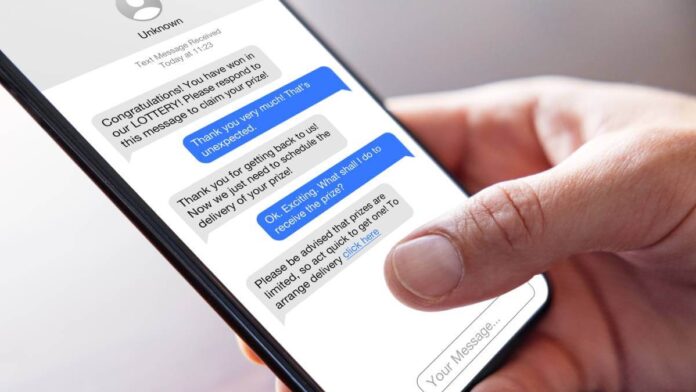You’ve probably noticed scammers love sending text messages.
It’s the most popular scam delivery method by far, according to figures from the consumer watchdog.
By exploiting our trust in institutions, whether it’s the bank, the post office or a toll company, they have stolen tens of millions of dollars from Australians.
Steps are being made to tighten the screws, but tackling the problem feels a bit like a whack-a-mole for authorities trying to crack down on the ‘scourge’.
How hard are Australians getting hit?
It’s been relentless and reports of scam text messages only increased last year.
There was a 37 per cent increase in text scams reported to the Australian Competition and Consumer Commission (ACCC) in 2023 compared to the previous year.
Australians reported that they lost about $26.9 million in 2023 to the scam delivery method, with 110,000 instances of scam texts reported.
But the criminals did not pull in as much money as the year before.
In 2022, Australians reported losses of $28.5 million from 80,000 reported text messages.
In the first two months of this year, text messages are still the top delivery method, with 16,795 notifications logged so far.
Where are these texts coming from?
Scammers use the same methods as reputable businesses to blast messages to our phones, according to Samantha Yorke from the Australian Communications and Media Authority (ACMA).
“These are basically just businesses that have technology that allows an organisation or a person to send a very high number of text messages in a very quick period of time,” she says.
“Unfortunately, these businesses are also being used by bad actors.”
Ms Yorke says people might suspect shady actors working overseas are the culprits, but a homegrown industry has emerged.
She points to the recent arrest of an alleged scammer, a Sydney man who allegedly sent millions of ‘suspicious’ messages.
“I think the inclination is to assume that these scammers are often offshore … but actually there are homegrown scammers as well,” she says.
“An industry that we shouldn’t be proud of here in Australia.
“They’re everywhere, unfortunately.”
What’s being done to stop them?
While tens of thousands of texts are reported to the ACCC, phone companies are blocking hundreds of millions of them.
More than 430 million messages since the introduction of a 2022 industry code aimed at cracking down on fraud, Ms Yorke says.
The code is about 35 pages long, but she says the most important requirement is that the names attached to text messages are verified.
Last month ACMA found that five businesses had breached the industry code.
“They had each allowed customers of theirs to send bulk SMS messages using these abbreviated business names in the message headers instead of the actual phone number,” she says.
Businesses found in breach of anti-scam rules by ACMA:
- Message4U: 36.1 million messages
- SMS Broadcast: 4.5 million messages
- DirectSMS: 1.6 million messages
- Esendex Australia: 6.7 million messages
- MessageBird sent: 1.1 million messages
Source: ACMA
Basically, this means scammers can impersonate companies and government organisations.
“This code requires businesses that are sending these SMS to check that they’re not being sent by scammers,” Ms Yorke says.
“The five businesses that the ACMA [found in breach] last month we’re not doing that.”
Ms Yorke says the companies have been given a formal direction to follow the code and could be hit with fines of up to $250,000 if breaches continue.
So why are we still getting the texts?
Ms Yorke says it’s a complex issue and there’s no silver bullet.
“They’re very agile, which is frustrating,” she says.
The ACMA is working to set up a registry of trusted organisations able to send texts with their business name.
Ms Yorke says it’s important because texts messages have become hard to trust.
“Some banks, for instance, are now only communicating with their customers through their banking app,” she says.
What else are companies doing about it?
Telstra customers are able to dob in scam texts to the phone company via a 7226 reporting number, the company’s cybersecurity expert Darren Pauli says.
So far customers have reported 250,000 text messages to the “message content-based” system.
He says that means customers need to forward suspect messages to the reporting number so Telstra can learn what scammers are sending.
“If you send it as soon as you get it, it’s like a times 10 impact multiplier,” Mr Pauli says.
How long will crooks keep targeting phones?
He says the future looks bleak, but telecommunications companies have a “moral obligation” to protect customers.
“I mean, Australia Post inspects its mail for dangerous goods, right?” Mr Pauli says.
“It’s not necessarily responsible for it, but there’s an obligation there, I guess – a moral obligation.”
He says other companies are also working hard to crack down on scam messages.
Optus does not have a scam reporting number, but in a statement a spokesperson said it had a number of anti-scam measures that have resulted in 137 million scam messages being blocked since December 2020.
 � 2020 Australian Broadcasting Corporation. All rights reserved.
� 2020 Australian Broadcasting Corporation. All rights reserved.
ABC Content Disclaimer


But, are the Telcos doing enough, yes Telstra has a Scam reporting number, but so should all the others, Optus, Vodafone, Belong etc.
SIM Card equipment like the one in the photo should be regulated and only available to appropriately registered companies, and the block of numbers issued also regulated and registered.
I am currently receiving around 2 – 3 per week,
EG:-
1) “Package issue: Update details” : +61461434173, when I do not have a package coming,
2) “Your toll bill of $5.83 is due” : +61484359324, I Live in South Australia (No Toll Roads, and haven’t been out of the state for over 16 Months.)
3) “PayPal Security Code” : +61458527101, and have not used PayPal for Several Months.